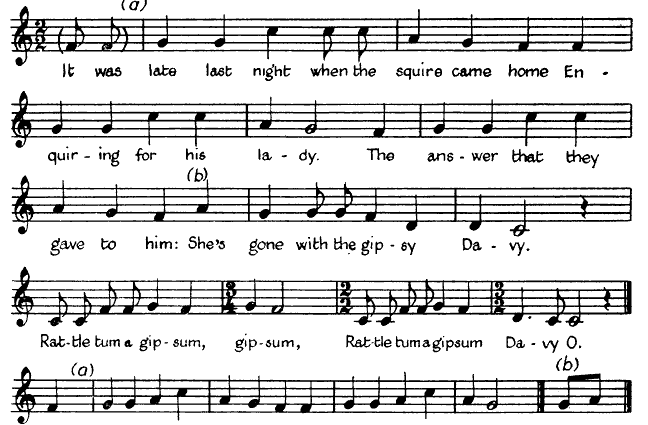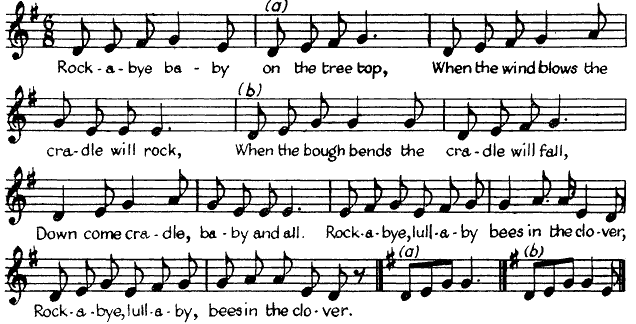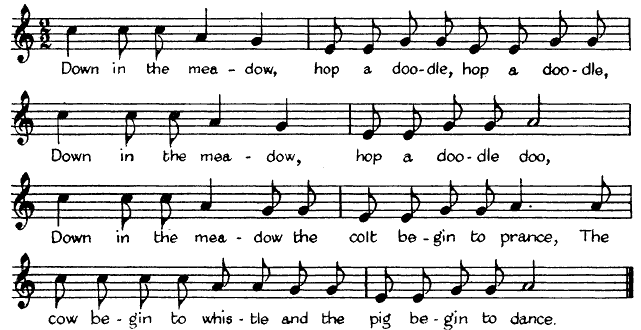A Return Visit to the Appalachian Mountains
by Maud Karpeles
Journal of the English Folk Dance and Song Society, Vol. 6, No. 3 (Dec., 1951), pp. 77-82
A RETURN VISIT TO THE APPALACHIAN MOUNTAINS
BY MAUD KARPELES
I AM happy to be able to contribute to this number of the Journal, dedicated to Miss Anne Gilchrist, a few gleanings from the Southern Appalachian Mountains, together with a short note on the collecting expedition that I made in Virginia, North Carolina and Tennessee in the fall of last year. Miss Gilchrist took a lively interest in an earlier expedition that Cecil Sharp and I made in the years 1916-18 and he acknowledges his debt to her in the classification of pentatonic tunes which we found in great abundance.[1] See English Folk Songs from the Southern Appalachians I, p. xxxiii. 77]
The expedition of last year had not the excitement of the earlier one when, thanks to the guiding hand of Mrs. John Campbell, a new world of English folk music was revealed. Yet " how little the New after all, how much the Old, Old World!" For the people, living in the seclusion of the mountains in homogeneous self-contained communities, were of British descentand the tradition of English folk music had been perpetuated by them to a greater extent and in a purer form than in England itself.
My object in re-visiting the mountains after an interval of rather more than thirty years was to find out to what extent the musical tradition had been maintained and what changes had taken place in the social and cultural life of the people during the intervening period.
My visit was sponsored by the Library of Congress who lent a tape-recording machine to me and my companion, Mrs. Sidney Robertson Cowell. We spent three and a half weeks in the mountainsa nd we concentrated on seeking out the singers, or members of their families, from whom Cecil Sharp and I had formerly obtained songs. It transpired that some fifty of these singers had died or could not be traccd, but I succeeded in finding thirty-one (either former singers or their near relatives). Of these, sixteen no longer remembered the songs, but, to compensate, the remaining fifteen (nine former singers and six relatives) sang to us and we recorded sixty-nine songs from them. In addition, five singers and instrumentalists, whom I had not previously known, gave us, between them, twenty-two pieces, making a total of ninety-one songs and tunes. In England this would have seemed a big number, particularly in view of the quality of the songs, but it does not bear comparison with what might have been recorded in the Appalachian Mountains thirty years ago had the facilities then been obtainable.
The fact is that life in the mountains has been completely revolutionized during the last twenty to twenty-five years and it is no longer the folk song collector's paradise that it once was. One hesitates to generalize on the evidence of such a limited sojourn, but I have every reason to believe that the changes that I observed would be found in a greater or less degree in all the mountain regions.
Roads and electricity have brought" civilization" to the mountains. Whereas, formerly there was little inducement for the people to grow more than they needed for their own requirements-and that was indeed little-markets have now been made accessible. Formerly there was leisure and time for the enjoyment of living; now everyone is so busy making money i n order to acquire labour-saving devices and other amenities, that there is little leisure left and many of the social graces of life have had to be sacrificed. Judged from a material point of view the standard of life is certainly higher, but there seems to be a corresponding loss on the artistic and cultural plane.
There are few homes that cannot boast an electric washing-machine and other products of modern progress. Unfortunately, these include the radio, the archenemy, except in certain favoured [1] circumstances of folk song. The extension of primary education is another factor that tends to weaken the hold of tradition. Formerly few of the mountaineers could read or write: now, except for the old people, it is the exception to find an illiterate person.
It is probably inevitable that these sudden changes in the social and economic structure of life should lead to the putting aside of the traditional arts that were associated with the old ways. Whether this is a temporary phase or a permanent condition will depend upon the place they fill in the life of the nation at large. Folk song is undergoing a wave of popularity in America, but unhappily it is all too often commercialized, and cheap " hill-billies" are substituted for the real thing. My friends in the mountains all agreed that the old songs were the best, yet somehow they felt that they must keep up with the times; but what a delight it was to them when occasionally they found that "the times" had come full circle and the songs of their childhood came back to them from the great world beyond the mountains. It would often happen that when the words of a song had been forgotten, I was able to produce it in a printed copy noted over thirty years ago from the same singer. With this before them they were able to completet he song. It was gratifying to be able to repay in kind a debt of longstanding.
Of the songs that we recorded, thirty-four had already been noted by Cecil Sharp and myself and they are published in English Folk Songs from the Southern Appalachians. [2 vols. Oxford University Press 1932.] I had hoped to make an analysis of the changes that these songs have undergone, but I have not as yet had the opportunity of transcribing them from the records. My impression received aurally is that in most cases there is only a slight modification which is confined to the auxiliary notes and does not affect the structure of the tune. A notable exception is the tune of 'Black is the Colour'.
The singer has unfortunately learned to play her own accompaniments on the harmonium. The sharpening of the leading note in the upper octave has transformed one of the loveliest of tunes into one that is utterly cheap and commonplace. The four tunes that are appended to this article have not previously been noted. 'The Gypsy Laddie ' was sung by Mrs. Donald Shelton, whom readers of the Life of Cecil Sharp will remember as Emma Hensley, then a girl of thirteen. She has inherited her parents' love of the songs and their musical talent. Her version of the tune, given below, is similar to one which was noted by Cecil Sharp in the same district (on the borders of North Carolina and Tenessee), but it is more economical in the use of passing notes and is a pure pentatonic tune.
'The Cruel Ship's Carpenter' also comes from North Carolina. It was sung with great feeling by Mrs. Charlie Noel (age 67) of Hot Springs. I have given it because of its interesting modal quality. As will be seen, it has the sharpened fourth, which is characteristic of the Lydian mode-very rare in English folk song. [Other tunes will be found in Journal of the Folk Song Society, No. 4, pp. 172-3, and No. 27, p. 74, and in English and American Collections.] In fact, Cecil Sharp, in the whole of his collecting experience, only once came across this mode, i.e. in the execution song, 'James Macdonald', which he noted from two members of a gipsy family named Holland o n Exmoor. [See Folk Songs from Somerset, IV, No. 103.]
'Rock-a-bye Baby' and 'Down in the Meadow' were sung by Mrs. Oscar Allen (formerly Ada Maddox) now living at Lynchburg, Virginia. She is a member of the church choir and no longer practises the "love songs", as they are called, so that it required some effort for her to recall them from the recesses of her memory. She had, however, retained her individual and musical style of singing which made a deep impression on us when we heard her over thirty years ago. The two little ditties had great charm as she sang them.
THE GYPSY LADDIE
Recorded in 1950 from the singing of Mrs. Donald Shelton (Emma Hensley).

1. It was late at night when the squire came home
Enquiring for his lady.
The answer that they gave to him:
She's gone with the gipsy Davy.
Rat-tle tum a gip-sum gip-sum,
Rat-tle tum a gipsum Da- vy O.
2. Go catch up my old grey mare,
The black he ain't so speedy,
I'll ride all night and I'll ride all day
Till I overtake my lady.
3. He rode and he rode till he came to the town,
And he rode till he came to Barley.
The tears came rolling down his cheeks
And there he spied his lady.
4. O come back, my own true love
O come back, my honey.
I'll lock you up in the chamber so high
Where the gypsums can't come round you.
5. I won't come back, your own true love,
Nor I won't come back, your honey.
I wouldn't give a kiss from the gypsen's lips
For all your land and money.
6. She soon ran through her gay clothing
Her velvet shoes and stockings;
Her gold ring off her finger was gone
And the gold plate from her bosom.
7. O once I had a house and land,
Feather-bed and money,
But now I've come to an old straw pad
With the gypsums all around me.
Note.-The last two stanzas were sung from the printed copy of the version noted from Mrs. J. G. Coates at Flag Pond, Tenn., September 1st, 1916.
THE CRUEL SHIP'S CARPENTER
Recorded in 1950 from the singing of Mrs. Charlie Noel, of Hot Springs, N.C. [This version is typically titled "Pretty Polly"]


1. Molly, O Molly, O Molly, said he,
'Will you agree, Mo ly get married to me?'
2. William O William, O William, said she,
I am too young, William, too young to marry you.
3. Molly, O Molly, dear darling, said he,
I have a good old friend, Molly, come, love, let's go and see.
4. We travelled over hills and through hollows so deep;
At last pretty little Molly so bitter-lie did weep.
5. William O darling, O William, said she,
I'm afraid my sweet William is leading me astray (bis).
6. Molly, my darling, I guess you're 'bout right;
I was digging your grave the best part of last night (bis)
7. William O William O darling, said she,
How can you kill the poor girl that loves you like me.
8. Molly, O Molly, I have no time to waste,
I've no time to tarry, no time to tarry here.
9. Then out of his pocket drew sharp knife in his hand,
Then out of his pocket drew sharp knife in his hand.
10. He opened her bosom as white as any snow,
He pierced the knife into her heart, O how the blood did flow.
11. He laid her in her grave and away he did go,
He left nothing but the small birds to hear her sad moan.
12. He laid her in her grave and away he did go
He swore by his Maker he'd sail to another shore.
13. He was sailing all on in his own heart's delight,
The ship began to sink and was fairly out of sight.
14. William, 0 William, 0 William, said she,
The death you owe the devil you'll shortly have to pay.
ROCK-A-BYE BABY
LULLABY
Recorded from the singing of Mrs. Oscar Allen (Ada Maddox), Lynchburg Va.

Rock - a - bye ba - by on the tree top,
When the wind blows the cra-dle will rock,
When the bough bends he cra - dle will fall,
Down come cra - dle, ba - by and all.
Rock-a- bye, lull-a - by bees in the clo-ver,
Rock-a bye, lull-a- by, bees in the clo- ver.
DOWN IN THE MEADOW
JIG
Recorded from the singing of Mrs. Oscar Allen (Ada Maddox), Lynchburg, Va.

Down in the meadow, hop a doo-dle, hop a doodle,
Down in the meadow, hop a doodle doo,
Down in the meadow the colt begin to prance,
The cow begin to whistle and he pid begin to dance.